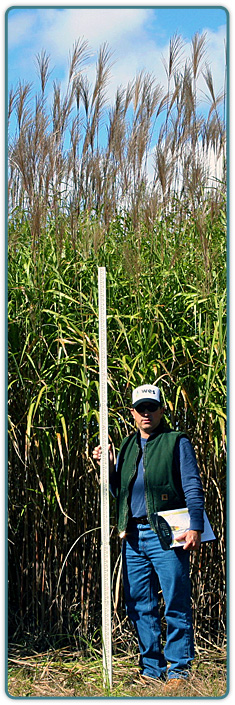 WES International's Chief Operations Officer, Nestor Vela, standing next to a 10' tall crop of Miscanthus.
WES International's Chief Operations Officer, Nestor Vela, standing next to a 10' tall crop of Miscanthus.
Home / Energy Crops
Energy Crops & Biomass Energy
We all know today’s energy supply is largely based on fossil fuels and nuclear power. These resources have contributed to environmental disasters and due to uncertain availability fossil fuels are unsustainable and create instability.
Renewable energy gives humanity the chance to reduce carbon emissions and will provide a more diversified and balanced blend of energy sources. However, the use of food crops such as corn and sugar cane for the production of bio-fuels has caused worldwide controversy.
Moving away from food crops, biomass energy has now become one of the most dynamic aspects of the energy arena and governments around the world are seeking to change regulatory structures encouraging the development of biomass to energy projects. Countries such as Australia, China, Colombia, Dominican Republic, Germany, Spain and Zambia among others, have become important producers of bio-fuel in the international market. United States and Brazil remain to be the most important producers of ethanol from corn and sugar cane respectively. But what about non-food crops capable to produce energy? Over the years, researchers have developed certain crops that require minimum input and grow under soil and water conditions that other crops can’t. For this particular reason these energy crops don’t take arable land dedicated for food production. For WES International, the implementation of energy crops in developing countries is vital to promote sustainable development and fossil fuel independence.
Vegetative biomass consists of living plants all around us. Plants store the sun’s energy in their leaves, stems, roots, fruits and seeds. They can be annual or perennial and some of them can be cultivated to produce solid, liquid or gaseous energy feedstocks. The organic residues and waste of all types of plant production such as sugar cane bagasse, do not fall under this term but nevertheless represent a large potential.
Renewable energy gives humanity the chance to reduce carbon emissions and will provide a more diversified and balanced blend of energy sources. However, the use of food crops such as corn and sugar cane for the production of bio-fuels has caused worldwide controversy.
Moving away from food crops, biomass energy has now become one of the most dynamic aspects of the energy arena and governments around the world are seeking to change regulatory structures encouraging the development of biomass to energy projects. Countries such as Australia, China, Colombia, Dominican Republic, Germany, Spain and Zambia among others, have become important producers of bio-fuel in the international market. United States and Brazil remain to be the most important producers of ethanol from corn and sugar cane respectively. But what about non-food crops capable to produce energy? Over the years, researchers have developed certain crops that require minimum input and grow under soil and water conditions that other crops can’t. For this particular reason these energy crops don’t take arable land dedicated for food production. For WES International, the implementation of energy crops in developing countries is vital to promote sustainable development and fossil fuel independence.
Vegetative biomass consists of living plants all around us. Plants store the sun’s energy in their leaves, stems, roots, fruits and seeds. They can be annual or perennial and some of them can be cultivated to produce solid, liquid or gaseous energy feedstocks. The organic residues and waste of all types of plant production such as sugar cane bagasse, do not fall under this term but nevertheless represent a large potential.
Some of the most popular non-food energy crops are:
- Giant Reed (Arundo donax L.)
- Miscanthus (Miscanthus X giganteus)
- Sweet Sorghum (sorghum bicolor L. Moench)
- Switchgrass (Panicum virgatum L.)